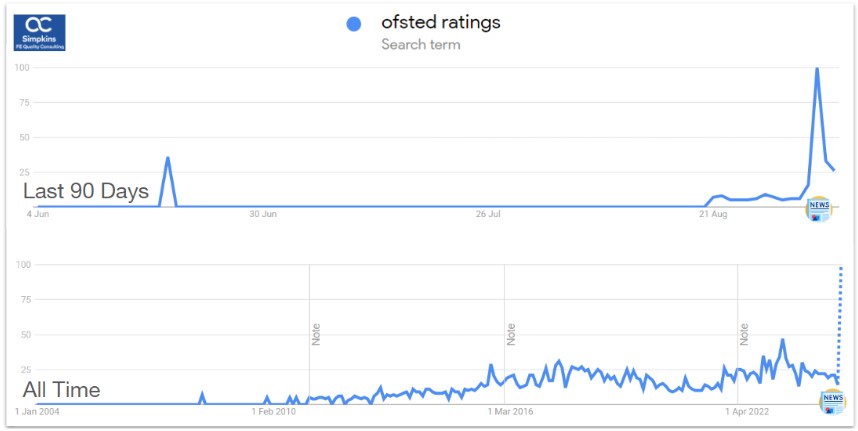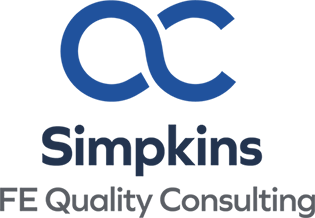
Ofsted's Big Listen: A New Era for Further Education and Skills Development
The recent Ofsted “Big Listen” consultation represents a crucial turning point for the Further Education (FE) and Skills sector. As someone who has long been involved in this field, I have followed these developments closely, and the changes are a welcome step forward for the industry. The proposed adjustments are timely and could set the stage for a more tailored and meaningful evaluation process that better aligns with the realities of apprenticeships, adult retraining, and skills development.
These changes come amid growing public interest in Ofsted’s role, as evidenced by a recent spike in Google Trends data following the announcement of the changes. In fact, according to Google Trends, public searches around Ofsted ratings in September 2024 reached unprecedented levels.

This shows the widespread curiosity and, in some cases, concern about what the end of single-word ratings will mean for the education sector. While much of the media coverage has focused on how these changes will affect schools, it is equally important to consider the implications for the FE (Further education) and Skills sector, where the stakes are high for learners, employers, and local economies.
A Farewell to the Single-Word Rating System
One of the most profound changes announced is removing the overall single-grade rating, a significant shift for the FE and Skills sector. Historically, providers have been reduced to simplistic labels like “Outstanding,” “Good,” “Requires Improvement,” or, at worst, “Inadequate.” While these ratings may have offered a snapshot, they often failed to reflect the complex, multifaceted nature of FE institutions, where strengths in areas like apprenticeship completion rates or employer partnerships might overshadow weaker areas.
The move away from these reductive labels is long overdue. For example, a training provider excelling in adult retraining programs might still need to improve its apprenticeship retention rates. These distinctions are critical for offering a more accurate and valuable assessment of a provider’s performance. The removal of the single-grade system acknowledges this diversity, allowing for a more nuanced evaluation that focuses on continuous improvement rather than achieving or maintaining a specific label.
This development mirrors changes in the school sector, where Prime Minister Sir Keir Starmer and Education Secretary Bridget Phillipson have emphasised the need for a richer, more informative approach. According to a BBC News report, the move aims to reduce high-stakes pressure while providing a more transparent picture of strengths and areas for growth. The same principles are needed in FE, where the focus should be on real-world outcomes like learner progression into employment or further study and employer satisfaction with apprenticeship programs.
A Tailored Framework for Further Education and Skills
Equally exciting is the potential introduction of a bespoke inspection framework explicitly designed for the FE and Skills sector. For too long, the sector has been shoehorned into inspection models created with schools in mind. This mismatch has often led to a misalignment between what is inspected and the unique nature of FE provision, which serves a diverse range of learners, from young people starting their vocational careers to adults seeking to retrain for new industries.
A tailored framework will acknowledge learners’ diversity and emphasise performance indicators that truly matter in the FE context. For instance, metrics like the rate of apprenticeship completion, the employability of graduates, and employer satisfaction with apprentices’ skills could be prioritised. Such a framework would be far more reflective of the contributions FE makes to both learners and the broader economy.
With these proposed changes, there’s also an opportunity to better align inspection criteria with sector-specific key performance indicators (KPIs). For example, the progression of learners into sustainable employment or further training and the development of crucial employability skills could become more central to the inspection process. This would provide a more accurate assessment of a provider’s impact and help drive improvements in these critical areas.
The Importance of Equitable Notice Periods
Another key proposal is the standardisation of notice periods for inspections across all providers. Currently, some providers receive more advance notice than others, a practice that has long been a source of frustration within the FE sector. The proposal to equalise notice periods is a welcome move toward fairness and equity, ensuring that all providers, regardless of size or value, have the same opportunity to prepare for inspections.
This change could also help reduce the stress and disruption often associated with inspections. With a clear and consistent timeline, FE providers will be able to integrate inspection preparations more seamlessly into their regular operations rather than scrambling at short notice. Moreover, this shift would remove any lingering suspicion of preferential treatment, reinforcing the idea that all providers are held to the same standards.
Preparing for a New Era in FE & Skills Inspections
Much like the school sector, FE and Skills providers must begin preparations now to align with the upcoming changes. According to a BBC report, the new system for schools will come into full effect in September 2025. While the timeline for FE may differ, it’s clear that preparation is vital in navigating this shift effectively.
One of the first steps FE providers should take is conducting a comprehensive self-assessment. This process should involve a detailed review of current practices, particularly in areas like apprenticeship delivery, employer engagement, and learner progression. By identifying strengths and areas for improvement early on, providers can position themselves to showcase their best practices when the new inspection framework is implemented. To dive deeper into effective self-assessment strategies, check out my podcast, Self-Assessment and Quality Improvement with Lou Doyle.
Moreover, evidence gathering will be crucial. Providers should begin collecting data that demonstrates their performance across key areas, such as learner progression rates, employer satisfaction, and the successful completion of apprenticeships. This data will not only be important for inspections but will also serve as a valuable tool for continuous improvement.
Supporting Continuous Improvement in FE & Skills
As Ofsted moves toward a more detailed and sector-specific approach to inspections, FE providers must embrace a mindset of continuous improvement. This is not just about compliance but about actively seeking ways to enhance provision quality. Professional development will play a key role here. Providers should ensure that staff are well-versed in areas such as curriculum development, apprenticeship delivery, and learner support, all of which are likely to feature prominently in future inspections.
Finally, as we look ahead, the FE sector needs to remain engaged with the consultation process. The Ofsted Big Listen has opened up a valuable dialogue. Still, the sector must continue contributing its expertise and insights to ensure that the final framework reflects the diversity and complexity of FE provision. Only through active engagement can we shape an inspection regime that is fair, accurate, and supportive of continuous improvement.
My Final Thoughts
The proposed changes to Ofsted inspections are a promising step forward for the FE and Skills sector, signalling a shift toward a more nuanced and tailored approach. Removing single-word ratings, developing a bespoke inspection framework, and standardising notice periods all point to a more equitable and reflective evaluation system. However, the success of these changes will depend on how they are implemented, and the FE sector must remain proactive in shaping the outcome.
Navigating the Transition: Opportunities and Challenges
While these changes bring substantial opportunities, they also present challenges that providers must navigate carefully. The transition to a new inspection framework will require significant preparation and a shift in organisational culture. Providers must invest in staff training to ensure everyone understands the new expectations. With the removal of single-word ratings, uncertainty may initially arise as the sector adjusts. While we don’t yet know precisely what these new ‘report cards’ will look like, they are expected to provide a “complete picture” of how an institution performs across various metrics.
Despite the uncertainty, this transition also offers a unique opportunity for providers to showcase their strengths in previously underemphasised ways. For instance, exceptional employer engagement practices or innovative digital learning strategies can be highlighted more prominently. This new system allows a more comprehensive portrayal of a provider’s quality, moving beyond traditional academic metrics.
Providers must stay informed and actively engage with Ofsted’s ongoing consultations as we approach implementation. By starting preparations now—conducting self-assessments, gathering evidence, and investing in professional development—providers can ensure they are ready to meet the challenges and opportunities of this new era in education and skills development.
Sources referenced:
- BBC News report on the proposed changes to Ofsted ratings and their impact on schools and FE.
- Google Trends data shows a spike in public interest following the announcement of the end of single-word ratings in September 2024.
Get in touch for more information or consultation support:
Email: mark@simpkinsfequalityconsulting.com
Phone: 07585112496





